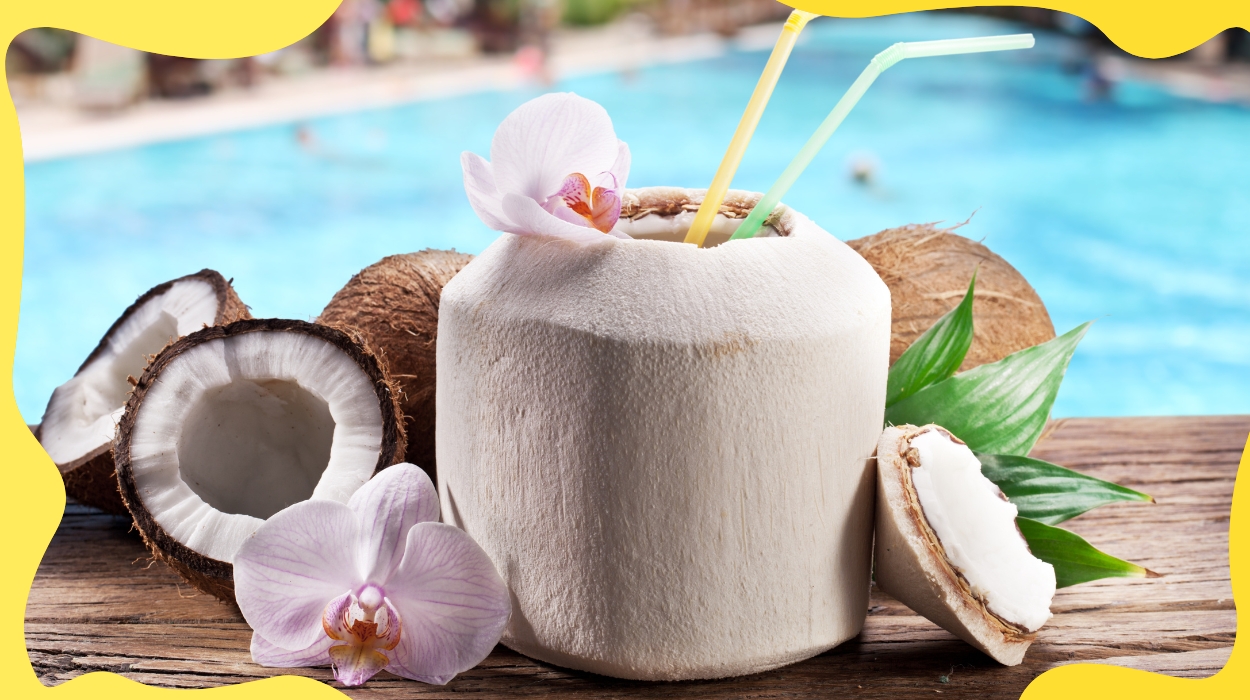Is Coconut Water Good For Diabetes? Better Hydration 2024?

Coconut fruit grows in tropical regions. The young coconuts can offer soft coconut meat and coconut water. We can also get coconut milk from the meat and coconut oil from the kernel. The potential benefits of coconut water have made this drink popular among health-conscious people. It is a source of minerals and carbohydrates, making this sweet liquid an alternative for hydration.
Naturally sweet coconut water may be used as an alternative to sports drinks by some individuals. It can also be enjoyed chilled on a nice warm day to calm your thirst. Due to its sweet flavor and content of natural sugar, it is important may lead you to wonder, is coconut water good for diabetes?
Is Coconut Water Good For People With Diabetes?
Yes, you can consume coconut water if you have diabetes. Consider limiting your intake to approximately 1-2 cups daily to prevent increasing blood glucose above optimal levels. Coconut water contains components that may be protective against diabetes complications. In addition, it can be an alternative to prevent dehydration. If you lack access to fresh coconut water, make sure you read the nutrition label to choose an unsweetened option.
Coconut Water Nutrition Facts
According to the United States Department of Agriculture, eight ounces or one cup of unsweetened coconut water[1] contains
- Calories: 43 calories
- Protein: 0.5 grams
- Fat: 0 grams
- Carbohydrates: 10 grams
- Sugar: 9 grams
- Calcium: 17 milligrams
- Magnesium: 14 milligrams
- Potassium: 396 milligrams
- Sodium: 62 milligrams
- Vitamin C: 24 milligrams
Coconut water has some good stats offering electrolytes and antioxidants like vitamin C. In contrast to coconut milk, coconut water does not contain fat and has very little protein.
Does Coconut Water Increase Blood Sugar?
Coconut water is a source of carbohydrates, mainly in the form of sugar. Although it may increase your glucose levels, it can still be part of your foods for diabetes shopping list.
You can compare the number of carbohydrates in coconut water to juice or soda to determine which is better for you. Eight ounces of fresh orange juice contains approximately 20 grams of sugar,[2] similar to other fruit juices. On another end, eight ounces of cola contain around 25 grams of added sugar.[3] Since unsweetened coconut water has only nine grams of sugar per cup, it may be a better option than soda or fruit juice regarding blood sugar management.
Take into consideration that coconut water still contains sugar. So, how much coconut water can I drink if I have diabetes? If you decide to drink coconut water, limiting your intake to around 1-2 cups per day might be best unless otherwise directed by your healthcare provider. Choose fresh coconut water or unsweetened packaged coconut water. Avoid replacing water with coconut water.
Benefits Of Coconut Water For Diabetes
Diabetes mellitus[4] is characterized by the body’s inability to produce enough insulin or use insulin properly. As a result, your blood sugar remains too high, putting your organs at risk. While coconut water contains sugar, it also contains nutrients that may be protective for people with diabetes.
Some benefits of coconut water include:
Potentially Protective From Diabetes Complications
A recent study[5] examined the effects of coconut water on blood sugar and diabetic retinal damage in rats. Researchers found that the subjects with diabetes that consumed coconut water had decreased retinal thickness. This indicates that coconut water may help reduce blood sugar levels and damage to the retina. However, more studies are needed to determine what exactly in coconut water may have this protective effect and whether this result can be replicated in humans.
Another study examined the effects of coconut water[6] on diabetes management in rats. Researchers noted that mature coconut water intake was associated with improved glucose levels and hemoglobin A1C percentages, comparable to the effect of antidiabetic medication. Again, further research is needed to expand on the results of these animal studies.
May Help Manage High Blood Pressure
Coconut water consumption may help manage high blood pressure. The potassium[7] content in coconut water may help manage blood pressure by increasing urinary sodium excretion, reducing plasma volume, and lowering blood pressure. On the other end, people that suffer from low blood pressure may need to avoid coconut water.
Adequate Hydration
The carbohydrate, potassium, and magnesium content aid in hydration. Coconut water can be an alternative for those wanting to hydrate after a workout if sugar-free sports drinks are not your thing.
If suffering from mild diarrhea or vomiting, coconut water may be useful. The sweet flavor of this coconut drink may be a good respite from the strong-tasting rehydration drinks to prevent dehydration.
Coconut water may be contraindicated[8] if you have elevated potassium blood levels, suffer from kidney disease, or use certain anti-hypertensive medications. As it is a source of potassium, coconut water may worsen your potassium levels. On the other hand, it may also be useful if you have had to use supplements to maintain adequate potassium levels.
Additionally, little is known about using coconut water during pregnancy and breastfeeding to determine its safety. Discuss with your doctor or a registered dietitian if you have these conditions and are interested in drinking coconut water.
How To Enjoy Coconut Water If You Have Diabetes
Drink Cold
You may be lucky to live near the beach or have access to fresh coconut water. Consume chilled fresh or packaged unsweetened coconut water as a refreshing drink. Avoid sugar-sweetened coconut water, which may increase blood glucose levels more than desired. Remember to limit yourself to approximately 1-2 cups per day unless otherwise directed by your doctor.
Blend It Out
Use coconut water as the liquid in a fruit smoothie. Remember to limit the amount of the fruit smoothie you consume, as it can cause your blood sugar levels to increase due to its natural sugar content. Feel free to balance it out with some added veggies like spinach. This smoothie will offer a variety of vitamins, antioxidants, and fiber. The fiber from fruits and vegetables helps delay the absorption of sugar into the bloodstream.
Cereal Trend
You can follow the trend and make the Nature’s Cereal Recipe advertised on Tik Tok using coconut water as a substitute for milk. Create a fruit bowl with berries, kiwis, pineapples, lime slices, or any other fruit you like. Then, pour in your cold coconut water.
Consider that fruit is a carbohydrate, so this breakfast bowl will increase your blood sugar. Being mindful of your portion sizes is important, but Nature’s Cereal can still be a refreshing breakfast alternative.
The Bottom Line
Coconut water can be consumed by people with diabetes. It is suggested that it should be limited to 1-2 cups per day since it still contains naturally existing sugar. On the upside, this delightful beverage is low-calorie, low-sodium, and contains many important electrolytes and vitamins.
It may help you manage diabetes, achieve weight loss goals, and restore electrolyte balance. However, if you have questions about incorporating coconut water into your well-balanced diet, consider meeting with your registered dietitian nutritionist.
+ 8 sources
Health Canal avoids using tertiary references. We have strict sourcing guidelines and rely on peer-reviewed studies, academic researches from medical associations and institutions. To ensure the accuracy of articles in Health Canal, you can read more about the editorial process here
- Usda.gov. (2023). FoodData Central. [online] Available at: https://fdc.nal.usda.gov/fdc-app.html#/food-details/2343047/nutrients
- Usda.gov. (2023). FoodData Central. [online] Available at: https://fdc.nal.usda.gov/fdc-app.html#/food-details/2344681/nutrients
- Usda.gov. (2023). FoodData Central. [online] Available at: https://fdc.nal.usda.gov/fdc-app.html#/food-details/2346111/nutrients
- and, D. (2023). What Is Diabetes? [online] National Institute of Diabetes and Digestive and Kidney Diseases. Available at: https://www.niddk.nih.gov/health-information/diabetes/overview/what-is-diabetes
- Dai, Y., Li Ning Peng, Zhang, X.-H., Wu, Q., Yao, J., Qiu Ju Xing, Zheng, Y., Huang, X., Chen, S.-M. and Xie, Q. (2021). Effects of coconut water on blood sugar and retina of rats with diabetes. [online] 9, pp.e10667–e10667. doi:https://doi.org/10.7717/peerj.10667.
- Preetha, P.P., V. Girija Devi and Thankappan Rajamohan (2013). Comparative effects of mature coconut water (Cocos nucifera) and glibenclamide on some biochemical parameters in alloxan induced diabetic rats. [online] 23(3), pp.481–487. doi:https://doi.org/10.1590/s0102-695×2013005000027.
- Nih.gov. (2019). Office of Dietary Supplements – Potassium. [online] Available at: https://ods.od.nih.gov/factsheets/Potassium-HealthProfessional/
- Medlineplus.gov. (2014). Coconut Water: MedlinePlus Supplements. [online] Available at: https://medlineplus.gov/druginfo/natural/1261.html



